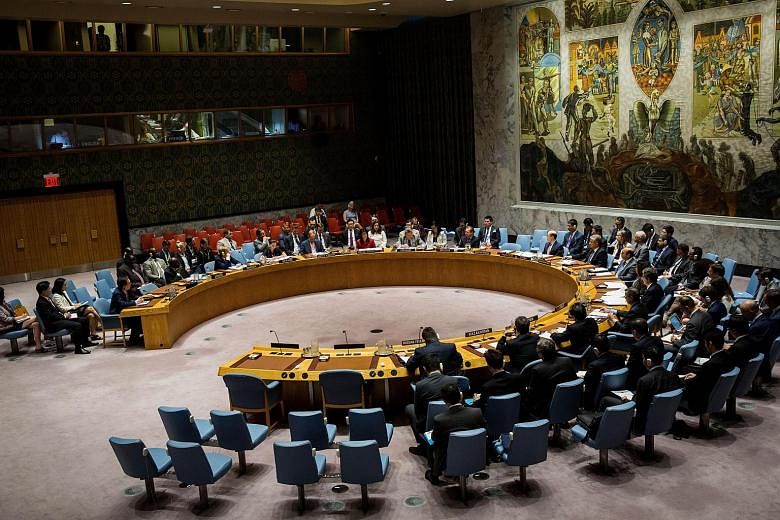SEOUL (AFP) - Nuclear-armed North Korea has muscled its way onto the agenda of the G-20 leaders' annual summit in Germany on Thursday (July 6), with Pyongyang's first test of an intercontinental ballistic missile (ICBM) set to dominate discussions.
The United States is seeking new sanctions against Pyongyang and is due to hold a summit with Japan and South Korea on the sidelines, while China and Russia are already urging restraint and negotiations.
Chinese President Xi Jinping and his Russian counterpart Vladimir Putin have suggested a simultaneous freeze on North Korean nuclear and missile tests and South Korea-US joint military exercises - a concept already rejected by Seoul and Washington.
The US and its allies are determined to avoid "rewarding bad behaviour", but a growing number of analysts say it will ultimately have no choice but to talk to Pyongyang.
Here are five questions and answers on the issue of negotiations.
Q: What does North Korea say about talks?
A: After the launch, according to the North's official news agency, leader Kim Jong Un reiterated Pyongyang's longstanding position that it will not put its missiles and nuclear weapons up for negotiation or "flinch even an inch" from developing them further unless what it calls the US "hostile policy" and threats against it are terminated.
Even then, it wants to be recognised by the US - which it sees as the relevant partner for negotiations, rather than the South - as a nuclear power.
Pyongyang regularly says it is willing to talk to the US with no preconditions, but that means it is not willing to accept any preconditions either.
Q: What about the US?
A: The US has long refused to take part in "talks for talks' sake", demanding under former president Barack Obama that the North take concrete steps towards denuclearisation first.
The Trump administration has repeatedly said that its patience with Pyongyang is over, while also stating that the "door to dialogue" is open in the right circumstances.
Mr Trump's own rhetoric has varied widely, at one point describing Mr Kim as a "smart cookie" and saying it would be an "honour" to meet him.
Washington has said it is not seeking regime change in the North - which former president George W Bush included in his "axis of evil" - but has also said, most recently at the United Nations on Wednesday, that military action was an option.
With the Demilitarised Zone that divides the two Koreas one of the most heavily-fortified places on Earth, and Seoul within range of the massed ranks of Pyongyang's artillery, that could rapidly spiral into a conflict that devastates both North and South.
Q: What talks have happened in the past?
A: In the 1990s, former US president Jimmy Carter and the North's founder Kim Il Sung negotiated the Agreed Framework, under which Pyongyang would freeze its plutonium programme in exchange for nuclear reactors and energy aid. The deal later broke down.
The Chinese-chaired "six-party talks" began in 2003, bringing together the two Koreas, China, Russia, Japan and the US in an attempt to persuade the North to give up its weapons programmes in exchange for security guarantees and development aid.
But the North carried out its first nuclear test in 2006 and walked out of the negotiations in 2009, leaving them dormant.
China, the North's key diplomatic backer and trade partner, has pushed for a revival of the process ever since, and this week reiterated its call to "bring the issue back to the right track of peaceful settlement through dialogue and negotiation".
So-called "Track 2" meetings, informal talks often involving retired officials, have continued quietly, enabling some communications between the two sides.
Q: What would the North want?
A: Pyongyang consistently says that it needs nuclear weapons to protect it from the threat of attack and invasion by the US and its allies, and its first priority is its own survival.
It sees the examples of past regimes whose pursuit of weapons of mass destruction (WMD) brought them into conflict with the West - most notably Saddam Hussein's Iraq and Moamer Kadhafi in Libya - as a salutary lesson.
Saddam's life ended on the gallows after a US-led coalition invaded Iraq - where no WMD were subsequently found - in 2003. Khadafi's Libya agreed to give up its weapons programmes later that year, and was the object of Nato bombing in 2011, when it descended into civil war and Khadafi was killed.
At the very least, Pyongyang would demand security guarantees, a peace treaty to formally end the Korean War, and the withdrawal of US troops from the South, as well as an end to sanctions and large sums in development aid.
Q: What would the US want?
A: Washington's long-held stance is that it will not accept a nuclear-armed North Korea. That means it wants to see "complete, verifiable, and irreversible" denuclearisation - a very high bar.
Verification would normally require independent observers to be able to have access to all relevant facilities.
And with the North having already carried out five nuclear tests, and now a successful ICBM launch, it has achieved a level of knowledge that makes "irreversible" disarmament virtually impossible.
For now, the two positions appear irreconcilable.
In a commentary on Wednesday on the ICBM launch, the North's official Korean Central News Agency, using the official name of North Korea, the Democratic People's Republic of Korea (DPRK), said : "One has to adopt a new way of thinking, first, if one wants to deal with the DPRK."

